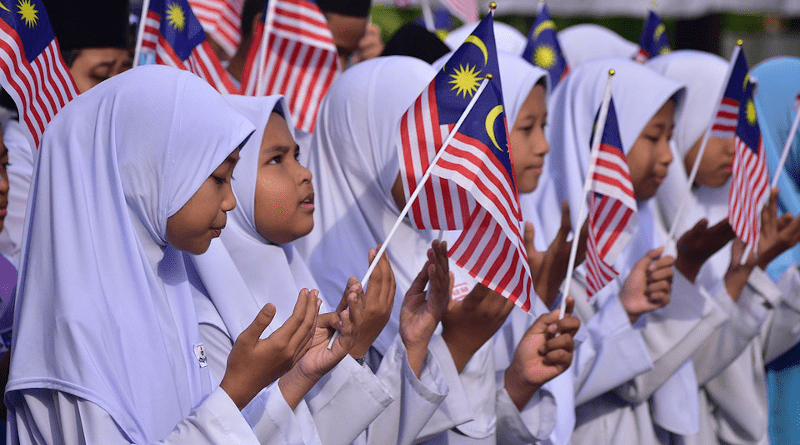Malaysia: Sabah, Sarawak Could Be Kingmakers In Elections – Analysis
By BenarNews
By Tengku Noor Shamsiah Tengku Abdullah and Iman Muttaqin Yusof
Sabah and Sarawak will be significant in next week’s Malaysian general election because these Borneo island states no longer are being seen as automatic supporters of the country’s oldest ruling bloc, Barisan Nasional, analysts say.
With a quarter of parliamentary seats between them in the Nov. 19 polls that some observers are predicting as too close to call, the coalition that these two states choose to support then will certainly form a new government, according to analysts.
“I would not say it is just ‘possible’ anymore. It is near to ‘definite.’ With only 165 seats in West Malaysia [peninsular Malaysia], definitely, Sabah and Sarawak will be the kingmakers,” Lau Zhe Wei, a political science professor from International Islamic University Malaysia, told BenarNews.
Sarawak has 31 parliamentary seats and Sabah 25. A party or a coalition needs to win 112 of 222 parliamentary seats, or have a simple majority, to form the next government.
Lau said parties would only need to win 80 to 90 seats in peninsular Malaysia, after which they could ally themselves, for example, with the main Sarawak-based coalition, the Sarawak Parties Alliance (GPS), in order to form a national government.
In Sabah, Barisan, which is anchored by the UMNO party, and the new Perikatan Nasional coalition, led by former Prime Minister Muhyiddin Yassin, already have allies, while there are also free-agent parties such as Warisan in play.
Before Barisan Nasional’s historic defeat in the 2018 general election, the coalition was allied with local parties both in Sabah and Sarawak. However, the partnership with the Sarawak parties was dissolved in 2020 and led to the formation of GPS.
“Before this, Sabah and Sarawak parties were part of Barisan. They never thought of leaving the coalition. To them, leaving Barisan brought them no good,” Lau said.
“But after 2018, they felt the need to go on their own, and no longer tie themselves with Barisan. That is why their support is important now.”
Deputy PM post
Another reason for the national coalitions to court Sabah and Sarawak parties is to shore up their support in government so they can avoid a situation like the one that happened after the 2018 election. That’s when governments with a slim majority collapsed like ninepins, and there wound up being three prime ministers in one term, two of them unelected and appointed by the king.
A solid government would need a two-thirds majority from a single party or from mutual political cooperation – hence, having support from GPS or parties in Sabah is crucial, Lau said.
Small wonder then that Barisan, Perikatan and the third major coalition in the fray, Pakatan Harapan, are trying to entice parties in these states with promises like never before.
Pakatan and Barisan in their manifestos have pledged to appoint a deputy prime minister from Sabah or Sarawak if they form the government. Malaysia’s deputy prime ministers have always been from peninsular Malaysia.
Perikatan has promised the Borneo states direct payment of petroleum royalties and to speed up the implementation of the 1963 Malaysia Agreement.
MA63, as it is otherwise known, stated that Sabah and Sarawak were equal to the former Federation of Malaysia and would have a higher degree of autonomy to rule their states.
Sabah and Sarawak are entitled to oil royalties as national oil company Petronas has built oil rigs in the states’ waters. Currently, oil revenue goes directly to federal coffers.
According to Lau, parties or alliances like Sarawak’s GPS would favor either Barisan or Perikatan instead of opposition leader Anwar Ibrahim’s Pakatan, because they perceive them as being easier to work with.
“I would see them working with Barisan or Perikatan rather than Pakatan Harapan. Both are more accommodating and tolerate such types of political partnering,” Lau said.
Meanwhile, Sarawak’s GPS might just be the one calling the shots, said analyst Awang Azman Awang Pawi, who expects the alliance to perform impressively.
“If in the 2018 general election they were only able to win 19 out of the 31 seats contested, then this time they are expected to be able to obtain a minimum of 25 seats out of 31,” said the associate professor from University of Malaya.
After the fall of the Pakatan government in 2020, GPS lawmakers were included in the federal administrations led by Muhyiddin and later by Barisan’s Ismail Sabri Yaakob.
One political scientist said GPS was likely playing a “wait and see” game.“Some GPS top guns have made it clear that they have no sentiment about any peninsular political bloc, and that they will wait. And there were reports said they will throw their weight behind a winning coalition, either Barisan or Perikatan,” Jayum A. Jawan, a political science professor at Universiti Putra of Malaysia, told BenarNews.
“They have specifically said that they would most likely not work with Pakatan due to DAP’s presence there,” he added.
The Democratic Action Party (DAP), which is a largely ethnic Chinese party, is part of Pakatan. Some are suspicious of DAP, which they sees as an ethnic Chinese centric party that puts the interests of Chinese front and center, to the detriment of Malaysia’s ethnic Malay majority.
Awang Azman said GPS basically has the Sarawak people’s interests at heart and its participation in the federal government has benefited the state.

